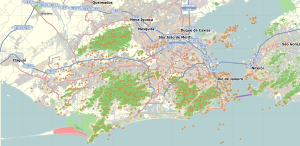Engenho Novo | |
|---|---|
Neighborhood | |
 | |
| Coordinates: 22°54′29″S 43°16′05″W / 22.90806°S 43.26806°W | |
| Country | |
| State | Rio de Janeiro (RJ) |
| Municipality/City | Rio de Janeiro |
| Zone | North Zone |
| Administrative Region | Méier |
| Area | |
• Total | 264.48 ha (653.54 acres) |
| Population (2010) | |
• Total | 42,172 |
| • Density | 16,000/km2 (41,000/sq mi) |
Engenho Novo is a neighborhood of middle class and lower middle of the North Zone of Rio de Janeiro, Brazil.[1]
The region's HDI, in 2000, was 0.858: the 45th best in the municipality of Rio de Janeiro.[2]
It neighbors the neighborhoods Méier, Vila Isabel, Lins de Vasconcelos, Sampaio, Jacaré, Cachambi and Grajaú.[3] It has 264.48 hectares of land area. It is part of a region called the Grande Méier encompassing the neighborhoods of the Abolição, Água Santa, Cachambi, Encantado, Engenho de Dentro, Jacaré, Lins de Vasconcelos, Méier, Piedade, Pilares, Riachuelo, Rocha, Sampaio, São Francisco Xavier and Todos os Santos. It is the fifth largest district population group.

The neighborhood is served by the Engenho Novo Station on the Deodoro Line of the Supervia rail network.[4]
It is cut by the ´"Rio Jacaré" which is a river that is currently severely degraded by urbanization and consequent pollution.
In it is located a unit of the traditional Rio de Janeiro teaching establishment, Colégio Pedro II, there is also a Scout Group (81º Caetés) that completed 50 years in January 2008, the neighborhood also has two sports clubs, Clube Lins and Vitória Tênis Club and also has the Celso Lisboa University Center.
It is an economically stagnant neighborhood because it suffers from the lack of investments in the area. The degraded landscape and the violence are due to repeated police attacks against residents of the favelas located in its perimeter and surroundings, namely: Matriz, São João, Céu Azul, Rato Molhado, Encontro, in addition to part of the Lins Complex.
A series of Pacifying Police Units were installed in the neighborhood in 2011, but at the beginning of 2017 they were withdrawn and there is no longer any pacification in the communities of these neighborhoods, due to the government crisis. The residences, in general, are old and decaying. Poorly maintained streets and poor security. Absence of cultural and recreational infrastructure, etc., meaning that its residents have to move to Méier or to the Tijuca region (nearby neighborhoods with better infrastructure).
The Engenho Novo Residents' Association is one of the most active in the city.
- ^ "Bairro: Engenho Novo". Prefeitura da Cidade do Rio de Janeiro. Retrieved 3 October 2014.
- ^ "Tabela 1172 - Índice de Desenvolvimento Humano Municipal (IDH), por ordem de IDH, segundo os bairros ou grupo de bairros - 2000".
- ^ "Bairros do Rio".
- ^ "Estações e Integrações". SuperVia. Archived from the original on 3 January 2015. Retrieved 3 October 2014.

